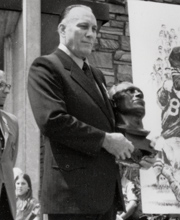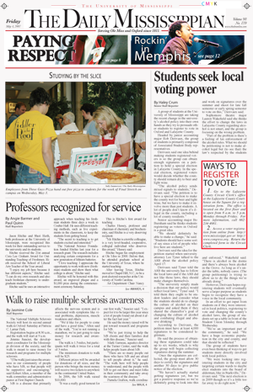
James Howard Meredith is an American civil rights activist, writer, political adviser, and United States Air Force veteran who became, in 1962, the first African-American student admitted to the racially segregated University of Mississippi after the intervention of the federal government. Inspired by President John F. Kennedy's inaugural address, Meredith decided to exercise his constitutional rights and apply to the University of Mississippi. His goal was to put pressure on the Kennedy administration to enforce civil rights for African Americans. The admission of Meredith ignited the Ole Miss riot of 1962 where Meredith's life was threatened and 31,000 American servicemen were required to quell the violence – the largest ever invocation of the Insurrection Act of 1807.

The University of Mississippi is a public research university that is located adjacent to Oxford, Mississippi, and has a medical center in Jackson. It is Mississippi's oldest public university and it is the second largest by enrollment.

William Thad Cochran was an American attorney and politician who served as a United States senator for Mississippi from 1978 to 2018. A Republican, he previously served in the U.S. House of Representatives from 1973 to 1978.

Ross Robert Barnett was the 53rd governor of Mississippi from 1960 to 1964. He was a Southern Democrat who supported racial segregation.

Paul Burney Johnson Jr. was an American attorney and Democratic politician from Mississippi, serving as 54th governor from January 1964 until January 1968. He was a son of former Mississippi Governor Paul B. Johnson Sr.

Sonny Stitt was an American jazz saxophonist of the bebop/hard bop idiom. Known for his warm tone, he was one of the best-documented saxophonists of his generation, recording more than 100 albums. He was nicknamed the "Lone Wolf" by jazz critic Dan Morgenstern because of his tendency to rarely work with the same musicians for long despite his relentless touring and devotion to jazz. Stitt was sometimes viewed as a Charlie Parker mimic, especially earlier in his career, but gradually came to develop his own sound and style, particularly when performing on tenor saxophone and even occasionally baritone saxophone.

The Ole Miss Rebels are the 18 men's and women's intercollegiate athletic teams that are funded by and represent the University of Mississippi, located in Oxford. The first was the football team, which began play in 1893.

John Frederick Coots was an American songwriter. He composed over 700 popular songs and over a dozen Broadway shows. In 1934, Coots wrote the melody with his then chief collaborator, lyricist Haven Gillespie, for the biggest hit of either man's career, "Santa Claus Is Comin' to Town." The song became one of the biggest sellers in American history.

Mississippi Veterans Memorial Stadium is an outdoor football stadium in Jackson, Mississippi, United States. Mississippi Veterans Memorial Stadium has been the home stadium of the Jackson State Tigers football team since 1970. Originally known as War Veterans Memorial Stadium, it was later known as Hinds County War Memorial Stadium. It was redesigned and enlarged in 1960 and Ole Miss vs. Arkansas dedicated Mississippi Memorial Stadium in 1961 before a capacity crowd of 46,000. With political support from Ole Miss and Mississippi State and leadership from Ole Miss Athletics Director Warner Alford, Mississippi Memorial Stadium was enlarged to 62,500 in 1981 and on September 26, 1981 Ole Miss and Arkansas again dedicated the facility before 63,522.

Frank Manning "Bruiser" Kinard Sr. was an American football tackle and coach and university athletic administrator. He was inducted into the College Football Hall of Fame as a charter member in 1951 and into the Pro Football Hall of Fame in 1971.

The Daily Mississippian, commonly called The DM, is the student newspaper of the University of Mississippi. The first issue of The Mississippian was published in 1911. It is operated as an independent student-run newspaper, and is published in print one day a week and online daily. It publishes Thursdays during the fall and spring semesters, and occasionally during the June and July summer terms. It has a daily print circulation of 9,000 during fall and spring. It is also the only college newspaper in Mississippi to be a full member of the state press association, and it competes in the Mississippi Press Association's Better Newspaper Contest against professional daily newspapers.

William Butler Jr. was an American soul jazz guitarist.
"Hail State" is the fight song and rally cry of Mississippi State University. The words and music were written by Joseph Burleson Peavey in 1939. The title of the song was adopted as the official domain name for Mississippi State athletics and for all social media platforms of the athletic department in 2014.

The Ole Miss riot of 1962, also known as the Battle of Oxford, was a violent disturbance that occurred at the University of Mississippi—commonly called Ole Miss—in Oxford, Mississippi. Segregationist rioters sought to prevent the enrollment of African American veteran James Meredith, and President John F. Kennedy was forced to quell the riot by mobilizing over 30,000 troops, the most for a single disturbance in American history.

Coaches and media of the Southeastern Conference (SEC) bestow the following individual awards at the end of each college football season.
Chester Conn(néMaster Chester Cohn; April 14, 1894 in San Francisco, California – April 4, 1973 in Flushing, Queens) was an American composer of popular music and music publisher.
Houston Davis was an American composer, arranger, teacher of music, dance band drummer, and later in his career, a justice of the peace in Hinds County, Mississippi.

The 1963 Mississippi gubernatorial election took place on November 5, 1963, in order to elect the Governor of Mississippi. Incumbent Democrat Ross Barnett was term-limited, and could not run for reelection to a second term.
Virginia Nelson, professionally known as Ginny Gibson, was a prolific New York recording vocalist. Gibson recorded jingles and popular songs. Her married surname, beginning around 1946, was Nelson. In 1958, she married Richard Dennis Criger (1925–2001). She divorced Criger in 1976. Gibson also recorded under the alias "Ginny Blue."

Clarence Benton "Buddie" Newman was an American politician who served as Speaker of the Mississippi House of Representatives from 1976 to 1988. He was elected to one term in the state senate before beginning his 36-year career in the House, representing his native Issaquena County.















